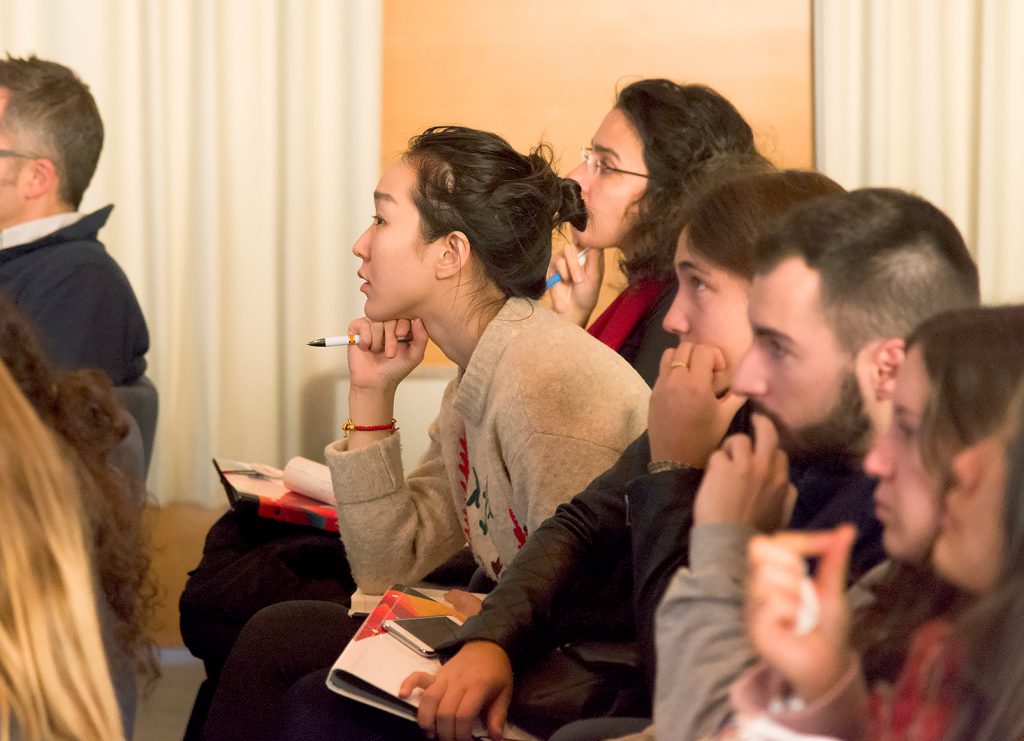21/12/2017
The URV welcomes its doctoral students for the 2017-18 academic year
The welcome ceremony was attended by many international doctoral students

The welcome ceremony was attended by many international doctoral students
At midday yesterday, URV doctoral students from Romania, Colombia, India, Italy, Thailand, Uruguay, Ghana, Cuba, Yemen and Venezuela attended the institutional welcome ceremony in the Auditorium of the Offices of the Rector. The ceremony has been organised by the Postgraduate and Doctoral School for the last four years and this year was attended by over one hundred students, most of whom are in the first year of their doctoral degrees. Students still have until April to register for one of the 24 doctoral programmes offered during the 2017-18 academic year in the ambits of the Arts and Humanities, Sciences, Social and Legal Sciences, Health Sciences and Engineering. Last year, there were 1237 doctoral students, 55% of whom were women and 45% men. Furthermore, 36% of the total number were international students, principally from Latin America, the European Union and Asia. The number of new students was 300 and the number of theses defended during the 2016-17 academic year was 234, of which 96 (31%) were awarded an international mention.
Doctoral students at the URV, a third of whom have predoctoral research contracts, are assigned to a research group to pursue a certain research line within their chosen programme and thus complete their theses. They can do this as full-time students in three years (or four, if needed) or as part-time students in five years (plus two additional years if required). According to Francesc Díaz, director of the Postgraduate and Doctoral School, “now that the academic year is well under way for many of these students, we use the welcome ceremony to remind them how doctoral degrees are structured at the URV and what they need to do, and we emphasise the transversal skills that they are expected to acquire, such as the ability to communicate and disseminate research and to manage the teams that they will encounter in their future careers.
During their first year, doctoral students have to present a research plan consisting of the thesis title and objectives and the methodology, tools and techniques that will be used. They must also sign a document in which they commit to completing the thesis and create their own doctoral student’s activities document which they will use to record every activity they have completed in relation to their theses, such as attending conferences, publishing articles and undertaking teaching collaborations and research visits, among many others. Their progress is monitored and evaluated by their thesis supervisors and coordinators. A positive evaluation at the end of each year is essential if they are to continue the following year.
The URV’s doctoral degree programmes offer their doctoral students (and except them to demonstrate evidence of) scientific learning at the highest level, scientific production (articles in indexed journals, patents), personal development through the acquisition of transversal skills, internationalisation (mobility, international distinctions), professional development and employability in the job market.
Participating in the ceremony were the rector of the URV, Josep Anton Ferré, who officially welcomed the students, Ignasi Salvadó, head of the Research, Transfer and Innovation Area, and Francesc Díaz. The closing words were given by Josep Manel Ricart, Vice-Rector for Scientific and Research Policy, who reminded those present that the EU has cited doctoral training as one of its priorities for constructing a European Research Area based on innovative principles. The long-term challenges facing Europe regarding demographics, competitiveness and sustainability must be resolved by making full use of the research and innovation potential of its citizens, and this is precisely where doctoral education has such an important role to play.
More news about: doctoral thesis
